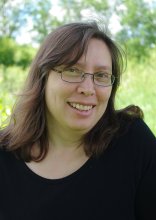

My mom was only 22 when her own mom died; at the time, I was an infant. The year was 1968, and Grandma Nettie, diagnosed with stage IV ovarian cancer, died within six months. She had surgery and cobalt radiation, but back then there was no Taxol or Carboplatin, not even Cisplatin. Ovarian cancer was her death sentence.
About 18 years later, just shy of my 18th birthday, I first began to menstruate. My periods were never regular and I got them anywhere from 6 weeks to 6 months apart. I thought something was wrong with my ovaries, and was afraid of getting ovarian cancer. My belief was that there are no signs and symptoms of ovarian cancer and if diagnosed, you will die quickly. I knew of no one who survived.
When I was 26 and pregnant with my first child, my first ultrasound showed bilateral ovarian tumors. I was an oncology nurse at the time and left an ultrasound, which should have been happy, in tears. I thought, “I’m pregnant and dying of cancer.” As it turned out, the tumors were benign. I had them removed after my son was born.
After the birth of my third son I started noticing some symptoms. If my kids bumped into my lower abdomen, I would have a moment of sharp pain. I also began noticing lower back pain and fatigue. But as an ICU nurse working the nightshift, I brushed these symptoms off as work related. Over time, these symptoms got worse. Additionally, I started to have periods that were a few weeks apart and included some cramping. This was a change for me.
I had not learned about ovarian cancer in school and was still under the belief that there weren’t early signs and symptoms. So, no surprise, ovarian cancer was not on my radar. But, when I finally felt a mass in my abdomen, I knew something was wrong. A transvaginal ultrasound confirmed my worst fear — ovarian cancer.
That was the worst day of my life. Until then, my life was very busy between work and raising 3 kids ages 3, 7, and 10. That day, everything suddenly came to a complete stop. I felt like the floor was ripped out from beneath me and I was free-falling.
I thought, “I have three kids. What are they going to do? Will my youngest even remember me? How long do I have to live?” I can’t even put into words the fear and panic and grief I was feeling. I was already starting to grieve for a life that wouldn’t include me — birthdays, first days of school, Christmas’s, graduations, weddings and my kids growing up without me. Just like my own life without a grandmother, my kids would have a life without me. I went from being the one in control and needing no one, to complete loss of control. I was paralyzed by my fears and grief. For the first time in my life, I reached out for help. Today, I’m so thankful for all those in my life who carried me through my darkest days -my husband, friends, family, church, and those at work.
At the time of diagnosis, I was fortunate to be referred to a gynecologic oncologist. I remember the doctor sitting down with me and giving me the time to answer all of my questions. He started by giving me hope, and then he saved my life. He performed a debulking and staging surgery, and I was diagnosed with stage Ic ovarian cancer. After surgery, I had six doses of Taxol and Carboplatin. I lost all my hair, but my care was excellent from surgery through chemotherapy.
That was almost eight years ago, and I am lucky to be without recurrence.
It took a year to heal physically from surgery and chemo. The emotional and spiritual healing took longer. The most important thing to my recovery was a gynecologic cancer support group I attended. What I needed more than anything was to meet people who had survived and were doing well. I have met some amazing women who have showed me how to embrace life in the face of death, and do it with grace, courage and joy.
Now, I love to sit with a patient, hold their hand, take the time to listen, and share my story of hope. I am part of the Survivors Teaching Students program in which ovarian cancer survivors educate medical and nursing school students with the message that there are signs and symptoms of ovarian cancer. I’ve attended the annual conference of the Ovarian Cancer National Alliance in Washington DC and have lobbied Congress (along with my husband) for money for ovarian cancer research and education.
But most importantly, my oldest son will graduate from high school this month. And I will be there.
